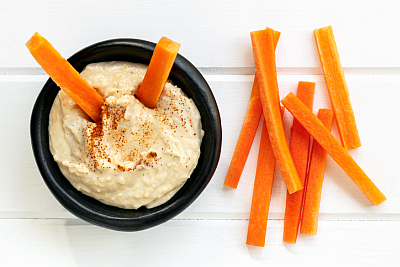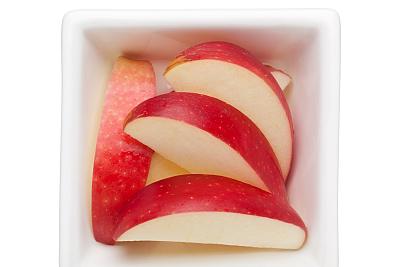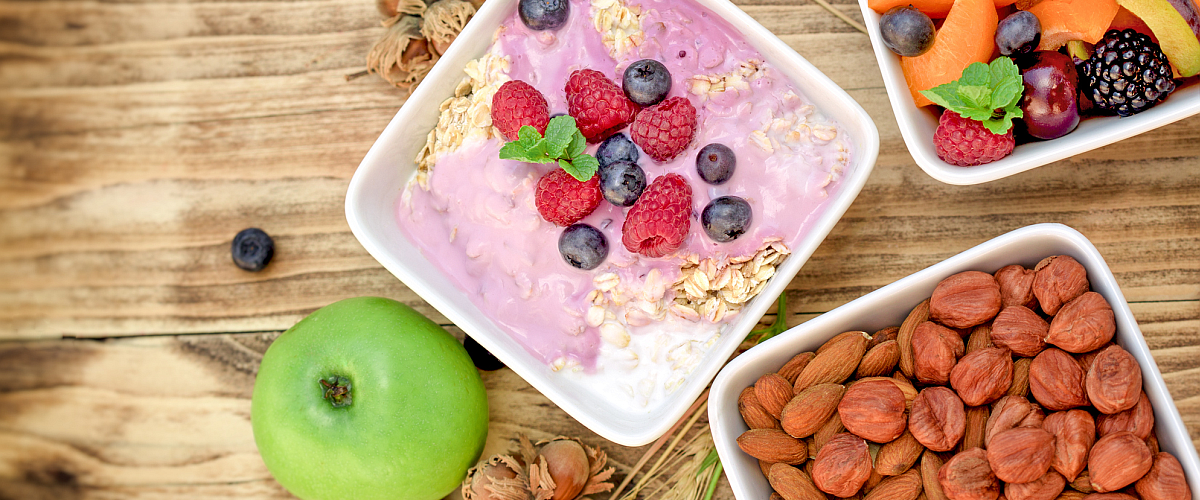Snacking seems so simple. If you’re hungry, eat! And let’s be honest, we all snack. But do we all snack smart? With a bit of planning and attention to some basic knowledge, you can be a smarter snacker. We caught up with Aramark Registered Dietitian Julie Joiner to give us some snacking advice.
When to Snack
 By definition, a snack is something that keeps you going until your next full meal.
By definition, a snack is something that keeps you going until your next full meal.
“Snacks help keep your energy up and help you focus on tasks when you’re running low on fuel,” says Julie. “But there is a right—and wrong—time for snacking. Ask yourself, ‘Am I eating out of boredom, or does my body actually need that little bit of extra fuel?‘“
Snack smarter by planning ahead! Get in the habit of snacking around the same time every day, which helps stabilize your routine and helps prevent a snack overload.
Snack attack at night? Beware!
“People who snack after dinner or in the middle of the night often over-snack,” says Julie. “Try to kick that habit if possible, or reach for healthier choices and smaller serving sizes if you can’t resist.”
Try to snack when:
- You’re truly hungry;
- A meal will be delayed; or
- You’re burning extra energy.
Watch out for: Unplanned nibbling – especially at night.
What to Snack
Snacking can be an effective way to fit extra nutrients into your diet (and can help you stay hydrated!), so it’s important to go for the good stuff.
Julie offers this advice: “Snacks work best when they’re balanced with a mix of protein like low fat yogurt or string cheese, fiber like whole grain pretzels or popcorn, and healthy fats like peanut butter or almonds. Snacks high in sugar, salt, and saturated fats won’t do you any favors. Stick to ones that are  satisfying and energizing—but also nutritionally sound.”
satisfying and energizing—but also nutritionally sound.”
Make sure your go-to snacks are prepped and available to set yourself up for success. Choose nibbles that are portable and easy to manage. Think no-heat, no-utensils types of food, like a granola bar, whole wheat crackers or vegetable sticks with hummus. There are endless recipes and snack ideas online, including our own, which are perfect for building your emergency stash of good-for-you options.
Aim to eat snacks that are:
- Nutritionally balanced;
- Simple and convenient; and
- Inspired by snack experts.
Watch out for: Empty calorie snacks high in sugar, salt or saturated fat.
How to Snack
How might seem like a strange question. After all, even a toddler has the answer: Open mouth; insert goodies! But eating with intention goes a bit deeper. It’s important to try and be aware of the food  you’ve chosen—to see, taste, and smell it as you eat it.
you’ve chosen—to see, taste, and smell it as you eat it.
Practice mindful eating. “Appreciating the food you eat at snack time—and every meal—can help you better understand when you are full,” says Julie. It will also help you to eat slower, which means you’ll have more time to savor healthy portions of your favorite snacks whether they’re healthy or indulgent.
An important aspect of mindfulness is knowing how to indulge—and all smart snackers do. It doesn’t mean depriving yourself. Many people can’t imagine cutting out cookies, cakes, candy, and chips. Instead, they indulge in moderation—meaning no big bags, boxes or bowls! They balance frequent healthier snacks with the occasional treat. But, when they indulge, they take time to enjoy their favorites.
Snack smarter by:
- Engaging your senses;
- Controlling your portions; and
- Knowing how to indulge.
Watch out for: Over snacking by “mindless munching.”
Note: Since everyone’s health history and nutritional needs are so different, please make sure that you talk with your doctor and a registered dietitian to get advice about the diet and exercise plan that‘s right for you.

